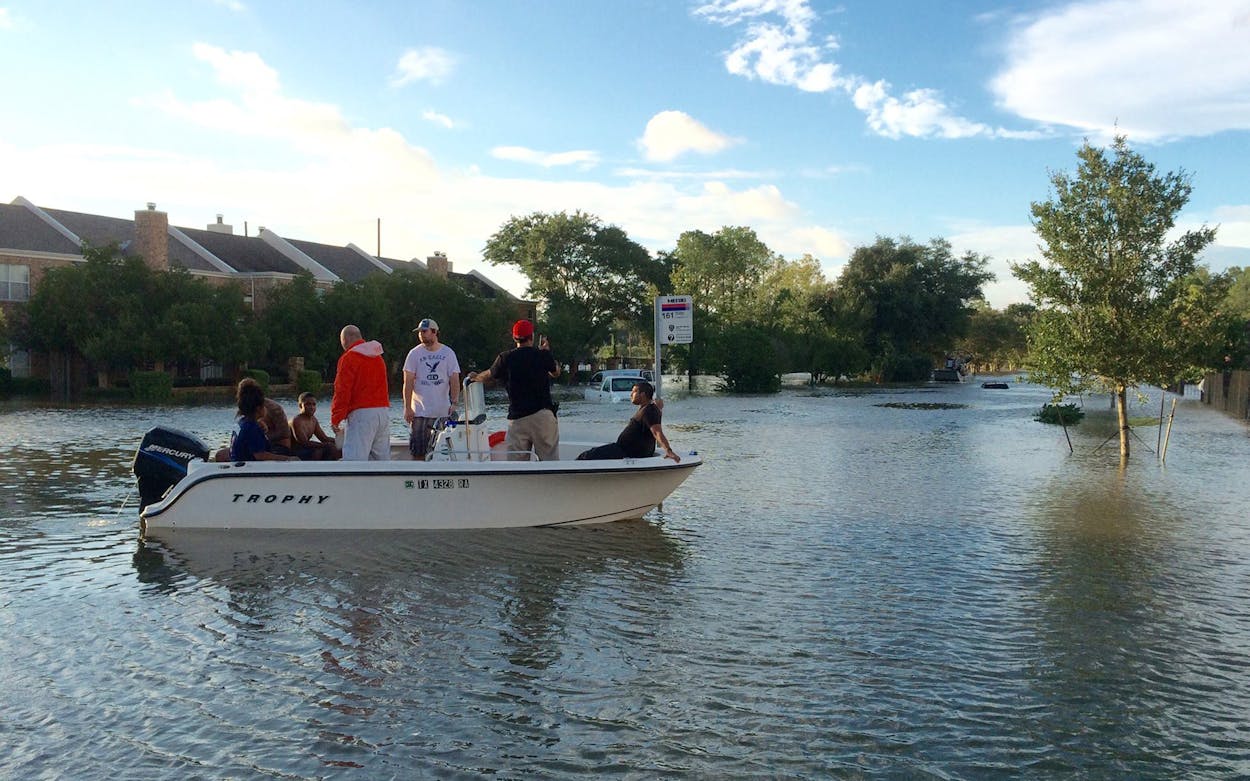Lacy Johnson, founder of the soon-to-debut Houston Flood Museum, doesn’t like the catchphrase “Houston Strong.” The tagline became ubiquitous in the weeks and months after Hurricane Harvey dropped fifty-plus inches of rain on the city last August, showing up on Astros team uniforms and proliferating as a hashtag on social media.
“It’s sort of macho and aggro,” says Johnson, an author, creative writing professor at Rice University, and longtime Houstonian. “It implies that the solution is strength, and that that’s how we overcome this thing. That doesn’t seem like the solution at all. It’s more about compassion and caring about our neighbors.”
What got Houston through Harvey, Johnson says, was ordinary people banding together to help each other out. Johnson’s husband, for instance, borrowed a neighbor’s canoe and helped evacuate people from flooded homes. Other Houstonians mucked out houses, or invited complete strangers to stay with them.
The Houston Flood Museum will be a website, not a physical building—“too many brick-and-mortar spaces is what got us into this mess,” Johnson jokes, referring to Houston’s overdevelopment—and its purpose is to keep alive the city’s collective memory of the natural disaster and the manner in which the city responded. There will be art and writing inspired by the storm; photographs and first-hand accounts of the flooding; an archive of media reporting; and a series of StoryCorps-style video interviews conducted by Houston Public Media with everyone from first responders to Mayor Sylvester Turner. Johnson describes the website as a “think tank with art.” It is scheduled to launch on August 28.
To preserve all these heterogeneous materials in perpetuity, Johnson is working with the Rice Library, the University of Houston Library, and the Houston Public Library to launch the Harvey Memories Project, an online archive of user-submitted content. Inspired by previous digital archives set up after Hurricane Katrina and the Boston Marathon bombing, the Harvey Memories Project is intended to allow anyone affected by the hurricane to contribute their photographs, video, or social media messages.
“This was probably the most digitally mediated natural disaster in American history, given how many smartphones are in the market now, and how many people were turning to social media during the storm” says Rice history professor Caleb McDaniel, who is helping lead the Harvey Memories Project. “Unfortunately, as we’ve seen before, social media services aren’t forever. If a company fails or decides to change the way posts are stored, things may disappear.”
Once they’ve been uploaded to the Harvey Memories website, however, your old tweets and Facebook posts will be preserved indefinitely for the use of future historians and researchers. “This is what librarians do best—make sure that materials get preserved, even if the technology becomes outdated,” McDaniel points out.
One of the librarians tasked with collecting and organizing all this material is Lisa Spiro, the executive director of digital scholarship services at Rice’s Fondren Library. Among the project’s challenges, she says, is ensuring that the user-submitted photographs and video are accurately labeled with the correct “metadata.” “We want to represent the diversity of perspectives, but also have a web archive that is trustworthy and of high quality.”
To spread awareness of the project and to encourage users to contribute materials, the Harvey Memories team will be holding several public events around the city timed to the first anniversary of Harvey in late August. The project’s leaders also want to hold events in other parts of Southeast Texas.
Johnson sees both the Harvey Memories Project and the Houston Flood Museum as ways for Houston and Southeast Texas to process what happened last fall and find ways to move forward as a city. Like many Houstonians, she was frustrated by the Houston City Council’s decision in April to unanimously approve a 900-home development on a former golf course in west Houston that sits inside the floodplain.
“It seems like we learn our lesson and then immediately forget it,” she says. “We’re a very amnesiac city in that way.”
- More About:
- Texas History
- Hurricane Harvey
- Houston








